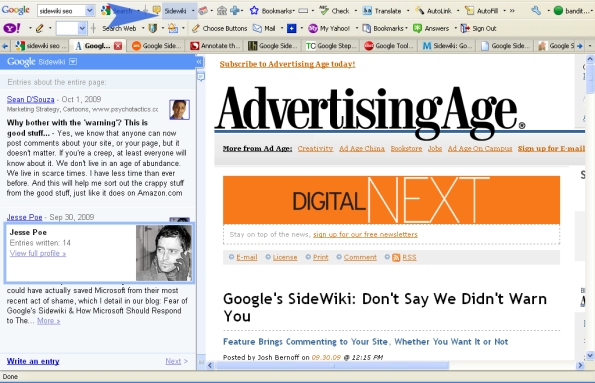Sidewiki is Internet Graffiti
There’s a new piece of Internet real estate website owners should be ready to grab – Sidewiki. Besides multiple domains, Facebook, Twitter and blog addresses, site owners should now download Sidewiki.
What is Sidewiki? It’s a Google toolbar application that allows visitors to comment on any web page whether an existing commenting system exists or not. The site owner has no control of the content, Google does.
Google uses an algorithm to decide which comments go at the top. And Google, not the site owner, decides which content must be taken down because it’s inappropriate.
Consider it a digital spray can and your website is the canvas for Internet artists and taggers. As a site owner you can “claim” your site to receive the top slot on your site. Gee thanks Google…letting us claim what’s already ours!

Whether the paint coming out of the Sidewiki spray can is beautiful art in the form of constructive comments and accolades or street graffiti in the form of spam or trolls is dependent on how well the comment algorithm works. Theoretically spammy and negative comments will be pushed to the bottom.
Google has developed an algorithm that it says can filter out obvious spam, naughty words, and the classic all-caps technique employed by some of the Internet’s more unhinged pundits, said Caesar Sengupta, group product manager at Google. As comments build over time, a recursive algorithm can analyze the quality of past comments using reader votes on the comment’s usefulness.
The other question is how many people will use it. I just downloaded it yesterday and I don’t see a lot of widespread use even on popular sites. However, I think adoption of Sidewiki will happen quite quickly. Early adopters are going to benefit significantly from it.
Opportunities for Sidewiki –
Sidewiki makes it even easier to share links, posts and even quotes from a page to Facebook and Twitter.
You can share your comments with your Facebook or Twitter accounts, and can post a link to a blog item discussing that Web page with a snippet of the text, Sengupta said.
Your Google profile is displayed on the page and your previous comments are archived for all to see. Unless you’re using a sock puppet to comment, thinking before you type and reputation management are even more important.
Site owners can gain some traffic, just by commenting constructively on popular sites. Of course right now, not many people are using Sidewiki, so those benefits may not be immediate.
Threats from Sidewiki –
Two threats seem to have emerged and I can’t really tell you which one is more dangerous; spamming and slamming.
Since Sidewiki allows links and no control from the site owner, it will be easy for spammers to make comments on highly trafficked sites. No determination on SEO has been established about Sidewiki yet, but it still seems like it could be an effective way to drive traffic. I’ll let you know!
Slamming a company, person or brand seems to be the other threat. Now a person could go to McDonald’s website and post a link to Burger King plus post a comment explaining their preference for a flame-broiled burger. This could be a brand management or reputation management nightmare!
While these are my two biggest concerns, some big names in the web community are voicing concerns over Google hijacking their site traffic by painting on this alternative universe of conversation. Utah top blogger nominee Phil Windley reports that Robert Scoble is upset about Sidewiki –
The discussion was on SideWiki. I’m afraid Robert was a little outnumbered, but it was a lively discussion and a lot of fun. Robert kept saying that it was unfair for Google to ride on top of his distribution.
Jeff Jarvis has similar concerns on his site. Scoble needn’t be worried. Few people have used Sidewiki on his site so far.
What should a website manager or blog author do about Google Sidewiki?
1. Download the application. You won’t be able to see or take part in the conversation if you don’t have it. Get it here. Now.
2. Claim your site. Take that top comment and make a statement about the application.
3. Be prepared. If this technology is adopted into the mainstream, it will be the next Twitter. Make comments on sites you like. Be aware everything you say will be recorded and potentially held against you, so be nice. If it turns into a nothing burger, then at least you’re in a decent position to manage your site and web reputation.







It doesn’t work on Google’s browser Chrome. Now there’s irony. Has potential, but the ability of unsubstantiated negative attacking seems to easy.
LikeLike
Google wants to put it there eventually. Reality is more people use IE and Firefox than any other browser, so they’re definitely going after the biggest market first.
Thanks for visiting and commenting Rob!
LikeLike
Have you checked out Chrome Frame? http://code.google.com/chrome/chromeframe/ I haven’t tried it yet, but looks interesting.
LikeLike
I haven’t yet. I’m a slow adopter of certain technologies. It took me forever to download Firefox. Now I hardly touch IE.
LikeLike